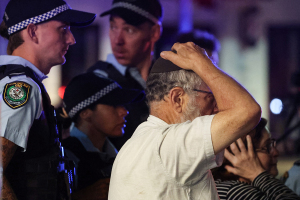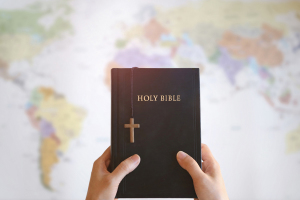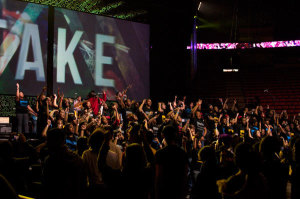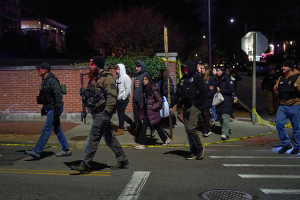Editorial: Anglican unity under threat around world
THE global Anglican church has faced many dangers of division throughout its long history, but few worse than the international conflict that now threatens to split the faith.
The catalyst for the conflict is the attitudes to teaching and tolerance concerning homosexuality in the church. In the Canadian diocese of New Westminster, same-sex blessings – a quasi-wedding ceremony – are allowed. Conservative Anglicans around the world are also affronted by the election of a gay priest, Gene Robinson, as bishop of New Hampshire in the US, and the ordination of Jeffrey John, also a homosexual, as Bishop of Reading in Britain. Both men have been in long-term male relationships for many years. John is now celibate, but Robinson continues his involvement with the man he left his wife and children for. The radical move to consecrate them as bishops is deeply disquieting for a large majority of Anglicans from both the Evangelical and Anglo-Catholic wings of the church, who believe the Bible and tradition prohibit sexual activity outside marriage for both homosexuals and heterosexuals.
Archbishop Peter Jensen of Sydney and his five regional bishops have condemned these developments as a clean break with Biblical teaching, defying the church's established attitude to same-sex relationships. They have made it clear they could not welcome the ministry of either Bishop Robinson or Bishop John, or even of any clergy who support the blessing of same-sex unions such as theirs. Dr Jensen and his colleagues believe biblical authority is absolute, and what the scriptures teach is their definitive expression. They consider any deviation from scripture for all guidance on belief and morals is a betrayal of the Reformation principles of the Anglican Church. Dr Jensen is on the record as saying truth is more important than unity. They regret the fracture in the worldwide church that this might involve, but think it is inevitable. Dr Jensen and his colleagues believe it is important for the church to stand against secular values they hold counter to the truth of Anglican belief – Christians must make a stand. While they accept that some people have a homosexual orientation, its physical expression for clergy is out of the question. Whether or not they would be equally determined to drive out discreet homosexual priests who happen to work in the Sydney diocese, the position of Dr Jensen and his bishops is in stark contrast with the liberals within the church, including the Archbishop of Canterbury, Rowan Williams. The liberals not only defend more tolerant attitudes towards gays, but argue that the church should repent its past cruelty to homosexuals. They believe faithful and abiding gay relationships should be honoured within the church. There seems little common ground between the two camps, and the risk of a profound and lasting schism in the Anglican Church, with Sydney playing a leading role, is now real.
Nor will Sydney necessarily be on its own. The Anglican communion is a pluralist body, its constituency ranging from the affluent Western churches of England, Australia and North America to communities of the Third World. The church in Nigeria alone accounts for 17.5 million of the world's 70 million Anglicans. While the Nigerian church does not reject polygamous converts, it is hostile to homosexuals, and Anglicanism's cultural global diversity is both a strength and a weakness. Conservatives across the world are uniting behind what they hold to be orthodox Christian teaching against those who urge a more inclusive church and a freer interpretation of the Bible. The positions of both camps are now so polarised division will be difficult to avoid. The Church of England, as the established church of that country, faces upheaval, with bishops taking opposing sides and no signs of compromise. The likely outcome is a church in such discord that hostility will replace fellowship, and distrust harm the pastoral activities of the clergy. Dr Williams faces the prospect that the worldwide Anglican faith – which has survived intact since the 16th century – could end up being irretrievably split by a doctrinal dispute over the sexual preference of the clergy.
State budgets have taken the easy road
NSW Treasurer Michael Egan's ninth budget – the sixth and final instalment of this year's state budgets cycle – is a solid and respectable but uninspiring affair. The state Labor governments have learned from the sins of their predecessors in the 1980s, woken up to fiscal reality, and accepted the value of living within their means while gradually reducing public debt. But the Labor treasurers, including Mr Egan, have taken their eyes off the ball this year and fluffed a historic opportunity to turbo-charge growth and employment by returning economic power to the people as tax cuts.
Instead, like his brother treasurers, Mr Egan has greedily gobbled up the stamp duty windfall generated by the die-hard property market – a stunning $800 million more than he was expecting this time last year – and used it, rather than cuts elsewhere, to fund Premier Bob Carr's March election promises in rail infrastructure, emergency wards, child protection and lower class sizes. Most home-buyers simply increase their mortgage to fund stamp duty, so what this effectively means is the state Government is forcing families into deepening debt to pay for services that should be funded through reform.
Worse than this is the fact that, despite their stamp duty goldmine, the state treasurers have sneakily ramped up a range of charges in order to be able to be able to increase spending while still balancing budgets. While Victorian Treasurer John Brumby applied the fiscal squirrel-hold to motorists, South Australian Treasurer Kevin Foley struck a new water levy, and their West Australian comrade, Eric Ripper, actually upped stamp duty, Mr Egan has returned to one of his Government's favourite fiscal watering holes, pubs and licensed clubs, for increased tax revenue from pokies, to the tune of an extra $173 million in 2004-07. He also announced some back-door stamp duty increases (calling them "anti-avoidance measures") and put a more modest squeeze on CBD motorists, public companies, and TAFE students.
The result is a cash surplus of $43 million in a $35 billion budget that Mr Egan carefully termed "balanced" (a word market researchers say voters prefer to "surplus"). Growth and employment in NSW are trending virtually identical to the national figures, which makes sense in an economy that comprises over a third of the national whole.
With state debt down to $4 billion from a mark of $12.2 billion in 1995, Mr Egan argues that NSW is firewalled against most external economic ills. But even if that is true, there are internal threats. The public is losing faith in a railway system that runs to the convenience of unions, rather than commuters, and the teachers union is starting to rattle its cage again. Responsible budgeting is really just the flipside of political courage. Unexpected good times have allowed the state Labor governments to disguise that fact in their 2003-04 budgets, but they will have to face it, sooner or later.



























